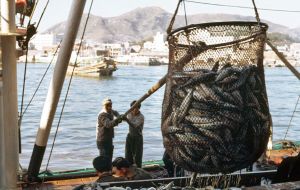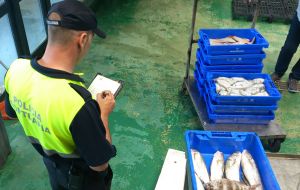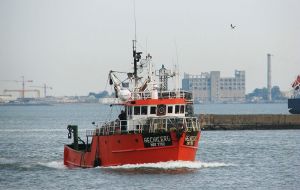MercoPress. South Atlantic News Agency
FAO sponsored illegal fishing accord scheduled to become law on 5 June; 30 countries have adhered
 Each year, IUU fishing is responsible for annual catches of up to 26 million tons, with a value of up to US$ 23 billion.
Each year, IUU fishing is responsible for annual catches of up to 26 million tons, with a value of up to US$ 23 billion.  “This is the dawn of a new era in the effort to combat illegal fishing, denying unscrupulous fishers safe haven and access to markets” said Graziano da Silva.
“This is the dawn of a new era in the effort to combat illegal fishing, denying unscrupulous fishers safe haven and access to markets” said Graziano da Silva.  “Port state measures” - at the heart of the soon to be active treaty -- refer to actions taken to detect IUU fishing when ships come to port.
“Port state measures” - at the heart of the soon to be active treaty -- refer to actions taken to detect IUU fishing when ships come to port.  Under the terms of the agreement, inspectors will be able to check on actual fish catches on visiting ships
Under the terms of the agreement, inspectors will be able to check on actual fish catches on visiting ships  Ships must request permission to enter ports ahead of time and provide data including on the fish they have on board, and allowing inspection of their log book
Ships must request permission to enter ports ahead of time and provide data including on the fish they have on board, and allowing inspection of their log book Illegal, unregulated and unreported (IUU) fishing is about to become much more difficult thanks to the imminent entry into force of the Port State Measures Agreement (PSMA), a ground-breaking international accord championed by FAO.
Now that the required threshold has been reached, with 30 Members having formally deposited their instruments of adherence, the countdown to the entry into force of the PSMA is underway and on 5 June 2016 the world's first ever binding international accord specifically targeting IUU fishing will become international law.
Collectively, the 29 countries and the European Union, which signed as a single party, have formally committed themselves through their instruments of adhesion to the Agreement account for more than 62% of worldwide fish imports and 49% of fish exports, which were US$133 billion and US$139 billion respectively, in 2013.
Each year, IUU fishing is responsible for annual catches of up to 26 million tons, with a value of up to US$ 23 billion. It also undermines efforts to ensure sustainable fisheries and responsible fish stock management around the world.
“This is the dawn of a new era in the effort to combat illegal fishing. By denying unscrupulous fishers safe haven and access to markets, the PSMA will drive the seafood industry toward greater sustainability and have significant ripple effects throughout the entire fisheries supply chain,” said FAO Director-General Jose Graziano da Silva.
“Let no port state be known and targeted by IUU fishing operators as a shelter for non-compliance,” he added, urging more countries to ratify the treaty.
“Port state measures” - at the heart of the soon to be active treaty -- refer to actions taken to detect IUU fishing when ships come to port.
The new treaty requires that parties designate specific ports for use by foreign vessels, making control easier. Those ships must request permission to enter ports ahead of time, and provide local authorities with information, including on the fish they have on board, and allowing inspection of their log book, licenses, fishing gear and actual cargo, among other things.
Importantly, the Agreement calls on countries to deny entry or inspect vessels that have been involved in IUU fishing, and to take necessary action. To support this, the Agreement also includes the obligation for parties to share information regionally and globally, regarding any vessels discovered to be involved in IUU fishing.
The PSMA applies to any use of a port, so even vessels that are just refueling will have to comply with inspection requirements.
Preventing unscrupulous fishers from landing their ill-gotten hauls makes it much harder for such catches to enter national and international markets. Compared to most monitoring, control and surveillance schemes, port state measures act as a highly effective - and cost effective - deterrent to IUU fishing activities.
In some cases, developing coastal countries and Small Island Developing States, which often host some of the world's most attractive fishing areas, face difficulties in implementing the PSMA.
Accordingly, FAO has invested substantially in capacity building projects to support the application of port state measures. Now that the Agreement is entering into force, FAO is launching a series of national, regional and inter-regional initiatives, including a global program on capacity development for implementation of the Agreement.
*The following States and regional economic integration organization are Parties to the Agreement: Australia, Barbados, Chile, Costa Rica, Cuba, Dominica, European Union - Member Organization, Gabon, Guinea Bissau, Guyana, Iceland, Mauritius, Mozambique, Myanmar, New Zealand, Norway, Oman, Palau, Republic of Korea, Saint Kitts and Nevis, Seychelles, Somalia, South Africa, Sri Lanka, Sudan, Thailand, Tonga, United States of America, Uruguay, and Vanuatu. (FAO).-




Top Comments
Disclaimer & comment rulesCommenting for this story is now closed.
If you have a Facebook account, become a fan and comment on our Facebook Page!